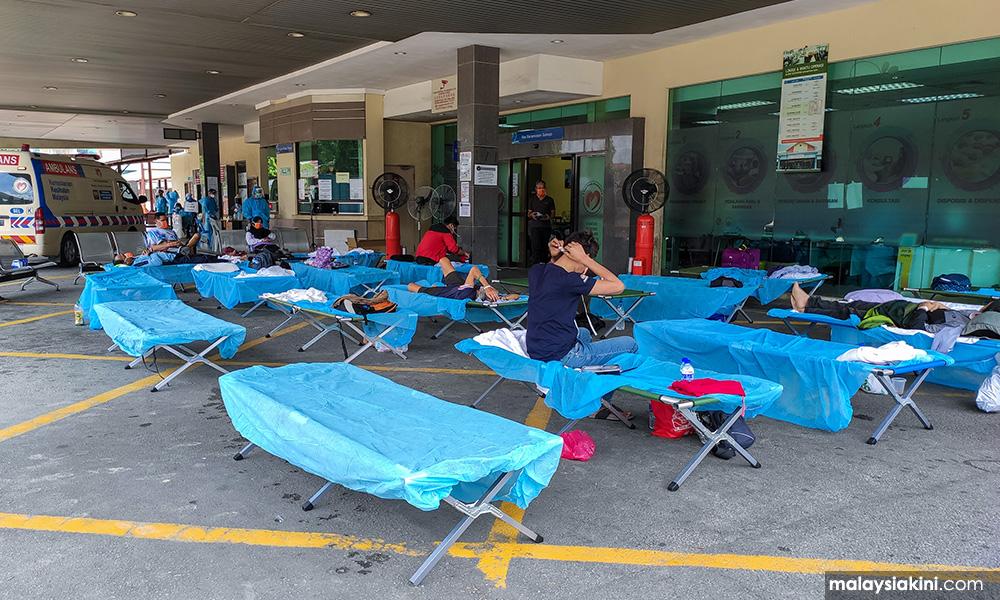The People’s Health Forum (PHF) has called on the government to take specific measures to alleviate the exceeding admission capacity of Covid-19 patients at hospitals in the Klang Valley.
“Increasing the rate of vaccination and tightening physical distancing measures are important public health measures, but these will not solve the problems that our over-stretched public hospitals in the Klang Valley are facing currently.
“We understand the Health Ministry has started to mobilise doctors and nurses from public hospitals in other states to help those in the Klang Valley.
“However, we need to urgently mobilise more resources to forestall the collapse of medical care in the Klang Valley,” said PHF representative and former Sungai Siput MP Dr Michael Jeyakumar Devaraj (above).
Among the groups involved in the forum are the Citizens’ Health Initiative (CHI), Agora Society Malaysia, Health Equity Initiatives, Parti Sosialis Malaysia, and Third World Network.
Among the suggestions by PHF to the government were:
- Transferring Category 4 Covid-19 patients to hospitals in neighbouring states such as Perak, Pahang, Negeri Sembilan, and Malacca.
- Invoking the Emergency Declaration provision which allows the government to temporarily acquire private hospital facilities to combat the Covid-19 crisis. Only a portion of hospital beds should be acquired to allow some ICU capacity for very ill patients.
- Prepare to borrow ventilators from Singapore, China, and Australia to expand Malaysia’s ICU capacity.
- Upgrade monitoring system of at-home patients for early detection of deterioration to the immunological phase of the illness. This can be done by implementing a system for patients to report their daily symptoms to Covid-19 Assessment Centres.
Jeyakumar stressed that the government needed to act fast to prevent from turning away critical cases that could otherwise be saved, due to the lack of capacity at hospitals.
“We need to recognise that even if the number of new cases in KL-Selangor miraculously drops to zero tomorrow, the over-stretched hospital services in the Klang Valley will continue to be inundated by about 640 new Category 4 Covid-19 cases each day for the next two to three weeks.
“This is because there is a time lag of about a week to 10 days between first symptoms to the development of breathlessness due to immunological over-reaction.
“The average number of cases diagnosed daily in the KL-Selangor region was 2,962 for the period of June 24 to 30, 2021 and 3,477 from July 1 to 5.
“Category 4 Covid-19 cases will require at least five to seven days of in-patient treatment to stabilise. This will push up bed occupancy rates which are already exceeding 100 percent in some government hospitals,” he said.

He told Malaysiakini there were two reasons that contributed to the rise in cases today.
“Firstly, I think it is the nature of the virus. Jakarta is facing the same problem as us - their beds are getting filled up. The Covid-19 Delta variant is more transmissible than previous variants.
“I also think we mismanaged the handling of undocumented migrant workers by scaring them away. People’s Health Forum previously requested a moratorium on immigration offences,” he said.
Malaysia reported 7,654 new Covid-19 cases yesterday, the highest since June 13 and new cases are on a 12-day uptrend.
Two days prior, on July 4, the Health Ministry reported that Klang Valley’s hospital bed capacity was past 85 percent usage.
When asked, Jeyakumar said he believed hospital capacity was over 100 percent.
“I think it is more than that. There are videos of people sleeping in corridors and camp beds.
"I think we are being given sanitised figures. It is more than 100 percent (capacity),” he claimed.
Jeyakumar added that cases could have been better controlled if migrant workers were granted a one-year moratorium in return for immunisation, instead of detaining them at immigration detention centres.
“We have about three million undocumented migrant workers, and the capacity to only hold a few thousand at these centres.
“If we continue to arrest and put them in detention centres, it will lead to a spike in cases,” he said.
However, Jeyakumar believed that it is not too late to call them in for immunisation in order to bring down the number of cases. - Mkini




No comments:
Post a Comment
Note: Only a member of this blog may post a comment.